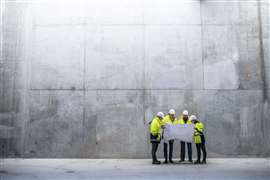Balfour Beatty goes all electric on live site for the first time
31 March 2023
Jo Gilroy, Group Sustainability Director at Balfour Beatty, shares an update on the company’s ongoing journey towards the Zero Carbon Construction Site of the future at the Royal Botanic Gardens Edinburgh.
 Royal Botanic Gardens, Edinburgh (Photo: AdobeStock)
Royal Botanic Gardens, Edinburgh (Photo: AdobeStock)
Gilroy says that for the first time on a live Balfour Beatty site, the company has gone all electric. “For a duration of six weeks, our team working to deliver our Edinburgh Biomes project at the Royal Botanic Gardens Edinburgh recently trialled a fleet of all electric plant, pushing the boundaries of what is possible and familiarising ourselves with the next generation of telehandlers, excavators, dumpers and wackers.”
Despite this, Gilroy says that there have still been challenges. One of the key challenges is electric vehicle charging infrastructure and the availability of viable charging stations.
Gilroy adds, “As you can imagine, most battery-powered plant is considerably smaller than diesel plant and therefore only offers enough power for around four-to-six hours of work before it needs recharging. In addition, as with electric cars and vans, electric plant is far more expensive to hire or purchase than traditional diesel machinery.”
However, reduced fuel costs and maintenance requirements are said to be able to make it considerably more cost-effective in the long run.
Gilroy says that there is no doubt that the switch to electric will require changes to the way in which they plan and manage their sites on day-to-day basis. “We’ll need to take action and ensure that we’re charging our electric plant overnight and utilising our Power Profiler tool - which recommends the most cost and carbon-efficient site compound set up, wherever possible. So undoubtedly, there are compromises and hurdles to overcome.”
However, one of the main advantages of electric over diesel plants is that they produce zero emissions. This is not only a clear step in the right direction for the construction sector, but it also means that they can operate in enclosed spaces or on smaller sites without additional ventilation and carbon monoxide monitoring.
Gilroy says, “We have also noticed a clear difference in terms of air quality, and noise pollution too. In fact, the machinery is so quiet during standard operations, our operating procedures and safety training will need to be updated to keep our workforce safe.
“However, in spite of all these benefits, all-electric plant isn’t yet a realistic option for our bigger sites, or for heavy plant. The required infrastructure does not currently exist to accommodate a fully electric fleet on a large scale, without a mains grid connection.”
Balfour Beatty’s view is that, for heavy plant, the priority for the industry has to be to accelerate the energy transition to hydrogen rather than rely on electricity providing the solution. “We are leading the way in making combustion engines work with hydrogen fuel for medium-sized plant such as telehandlers and traditional diggers, through our partnership with JCB and Sunbelt Rentals. We are also working with GeoPura and Siemens Energy on hydrogen fuel cells to generate power without an electrical connection. The potential of this work is huge.”
STAY CONNECTED


Receive the information you need when you need it through our world-leading magazines, newsletters and daily briefings.
CONNECT WITH THE TEAM











